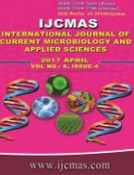


 National Academy of Agricultural Sciences (NAAS)
National Academy of Agricultural Sciences (NAAS)

|
PRINT ISSN : 2319-7692
Online ISSN : 2319-7706 Issues : 12 per year Publisher : Excellent Publishers Email : editorijcmas@gmail.com / submit@ijcmas.com Editor-in-chief: Dr.M.Prakash Index Copernicus ICV 2018: 95.39 NAAS RATING 2020: 5.38 |
Air pollution is a heterogeneous, complex mixture of gases, liquids, and particulate matter. Air pollution has become increasingly visible in cities and towns across world. Many factors contribute to air pollution including industry, lack of vehicular emission controls, dirt roads, poor fuel quality, open burning agricultural dust and pesticides and an expanding maquiladora industry. Our plan will lead to reductions in air pollutant emissions that cause smog and acid rain by up to 55% as early as 2018. To get there, our plan will set national caps for industrial emissions of four air pollutants commonly associated with smog and acid rain, namely nitrogen oxides, sulphur oxides, volatile organic compounds, and particulate matter. Caps will also be set for other air pollutants such as mercury from electricity produced by combustion, and benzene emissions from the natural gas, and iron and steel sectors. Plants plays significant role in mitigation the air pollution and maintains ecological balance. Plants acts as the scavengers for air pollution as they are the initial acceptors. Various pollutants can be absorbed accumulated by the plants results in reducing the pollutant levels in the environment. The identification of the tolerant plant species suggests suitable plant species to green-belt development and social-forestry programs.
 |
 |
 |
 |
 |